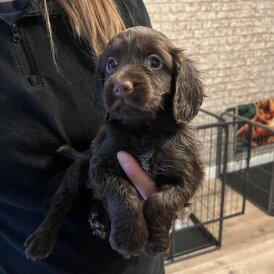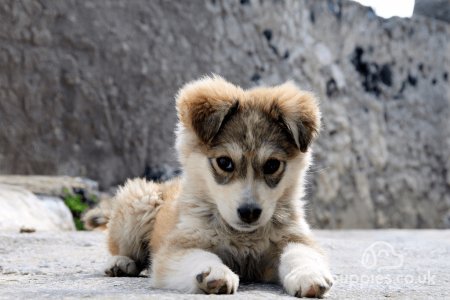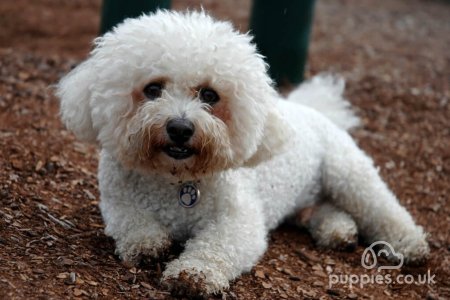Things to consider when looking at Working Cocker Spaniels for Sale
Their extremely high energy levels require substantial daily exercise and mental stimulation. If not given adequate physical and mental activity, they can become destructive or develop behavioural issues. They may have a strong hunting instinct that can lead to chasing wildlife or ignoring recall commands. Their intelligence means they need engaging activities to prevent boredom.
History of Working Cocker Spaniels
Working Cocker Spaniels share the same ancient heritage as their show-bred relatives, descending from the original spaniel breeds that arrived in Britain centuries ago. However, the Working Cocker's specific development began in earnest during the early 1900s when breeders began to separate lines based on function rather than just appearance.
The split became more pronounced after World War II when show breeding began to prioritise aesthetic qualities over working ability. Dedicated breeders of working dogs maintained bloodlines focused on hunting prowess, stamina, and field performance. The introduction of some English Springer Spaniel blood in the 1960s helped revitalise working lines that had become less functional due to show breeding influences.
Today's Working Cocker Spaniel represents generations of selective breeding for athleticism, intelligence, and working ability. They have regained their position as one of Britain's premier gundogs, often outnumbering other spaniels in the field. The Kennel Club now recognises the distinct characteristics that separate working and show lines, though both remain part of the same breed.
Appearance
How big is the Working Cocker Spaniel?
A typical Working Cocker Spaniel will measure between 38 and 43cm at the withers, with males generally being slightly taller than females.
How heavy is a Working Cocker Spaniel?
A male or female Working Cocker Spaniel typically weighs between 12kg and 16kg, with their lean, athletic build contributing to their agility and stamina.
What Colour is the Working Cocker Spaniel?
Working Cocker Spaniels come in a wonderful variety of colours including solid black, liver (chocolate brown), golden, and red. They can also have combinations such as black and white, liver and white, blue roan, and orange roan.
Temperament
Do Working Cocker Spaniels make good guard dogs?
Working Cocker Spaniels are not natural guard dogs due to their inherently friendly and sociable nature. While they may alert you to visitors, their instinct is typically to greet strangers with enthusiasm rather than suspicion. Their value lies in their companionship and working abilities rather than protection.
Do Working Cocker Spaniels bark a lot?
Working Cocker Spaniels can be vocal, especially when excited or under-stimulated. They may bark more than show lines due to their higher energy levels and working instincts. Proper training and adequate physical and mental stimulation can help manage excessive barking tendencies.
Are Working Cocker Spaniels easy to train?
Working Cocker Spaniels are highly intelligent and eager to please, making them generally easy to train. Their working heritage means they respond exceptionally well to positive reinforcement and enjoy having a job to do. However, their high energy can make them easily distracted, so training sessions should be engaging and varied.
Health
How long do Working Cocker Spaniels live?
Working Cocker Spaniels typically live between 12 and 14 years, with some living even longer with proper care. Their focus on functional breeding often contributes to better overall health and longevity.
How much exercise does a Working Cocker Spaniel need?
Working Cocker Spaniels require substantial daily exercise - at least 1 to 2 hours of varied activity including walks, off-lead running, swimming, and mental stimulation. They thrive on activities like agility training, scent work, and retrieving games. Without adequate exercise, they can become restless and potentially destructive.
What are Working Cocker Spaniels Common health issues?
While generally healthy, Working Cocker Spaniels can be prone to hip dysplasia, progressive retinal atrophy (PRA), ear infections due to their floppy ears, and occasionally allergies. They may also experience exercise-induced collapse in rare cases. Regular health testing by reputable breeders helps minimise these risks.
Average costs
As a rough guide in pricing: Cost to buy: between £800 and £1,800 for a well-bred Working Cocker Spaniel puppy from health-tested parents. Other costs: £50-100 per month for food, veterinary insurance, grooming supplies, and enrichment activities. Working Cockers may have higher ongoing costs due to their exercise and mental stimulation needs.
Specific Buying Guide
You can read our general buying guide here, with the most important aspects being meeting your Working Cocker Spaniel puppy with its mother and thoroughly checking the breeder's credentials.
Other reading, Adopting Working Cocker Spaniel Puppies and Rescue Organisations
A big thank you to the following sources who helped to shape this article: The Working Cocker Spaniel Society, The Kennel Club breed information, various working gundog associations, and experienced Working Cocker Spaniel breeders and owners who shared their expertise about this remarkable breed.














